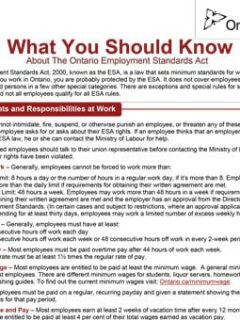Is Drinking at Work Just Cause for Termination? Employees can be terminated at any time for any reason so long as the employer provides notice. However, in certain situations employers can terminate employees without notice if they have “just cause” to terminate the employee. Thus, the question becomes, does drinking at work constitute “just cause”? …
Employment Law
Employers sometimes ask me – what is the maximum amount of notice we need to give long-standing employees upon termination? How Much Notice for Long-Term Employees Upon Termination? I used to tell them 24 months was the maximum notice an employee was entitled to upon termination. However, since the beginning of 2016, I now have …
As a result of the much blogged about changes made to the Employment Standards Act, 2000 (the “ESA”), which came into force in the new year, Ontario’s Ministry of Labour drafted a new poster entitled “Employment Standards in Ontario” (the “Poster”) reflecting these changes. What this Means for Employers All employers must replace their old …
Here is a list of the cases which changed employment law in Canada in 2017 (in no particular order). Note that some of these cases are not yet published on CanLII and therefore, there is no link available. Stewart v Elk Valley Coal Corp., 2017 SCC 30 The Supreme Court of Canada held that the termination …
Two recent Small Claims Court cases demonstrate the courts’ willingness to sanction employers for improper just cause allegations. These cases highlight the fact that employers need to be cautious in asserting just cause. If employers make a just cause allegation that they shouldn’t have, they could be on the hook for $10,000 in extra punitive …
It offends the Employment Standards Act Section 5 of the Employment Standards Act (“ESA”) prohibits employers from waiving or contracting out of any of the employment standards prescribed in the ESA, except to provide a greater benefit to the employee. Any such contracting out is void. Typically, the area of concern in an employment contract …
March 25 Update: In light of the COVID-19 pandemic, the Canadian government has proposed legislation to establish a new kind of income replacement benefit called the Canada Emergency Response Benefit (CERB). The CERB will temporarily replace all new applications for Employment Insurance once it is in place. We don’t yet know if the CERB will require an …
Employers generally owe their employees common law reasonable notice upon termination without cause. However, if the parties agree to a probationary period in an employment contract, the right to common law reasonable notice can be ousted if the employee is terminated within the probationary period. A recent Ontario Court of Appeal case, Nagribianko v. Select …
Introduction The Ontario Court of Appeal, in Brake v. PJ-M2R Restaurant Inc., 2017 ONCA 402 (CanLII), recently clarified the law of mitigation. The duty to mitigate is an employment law principle that requires employees who are terminated without reasonable notice (i.e. a wrongful dismissal) to look for a new job. If a new job is …
The laying of a criminal charge alone does not constitute just cause (i.e. dismissal without notice) in every instance. In order to summarily dismiss an employee for being charged with a criminal offense, the employer must show that there is some connection between the charge and the employer. In this regard, the employer must show …




